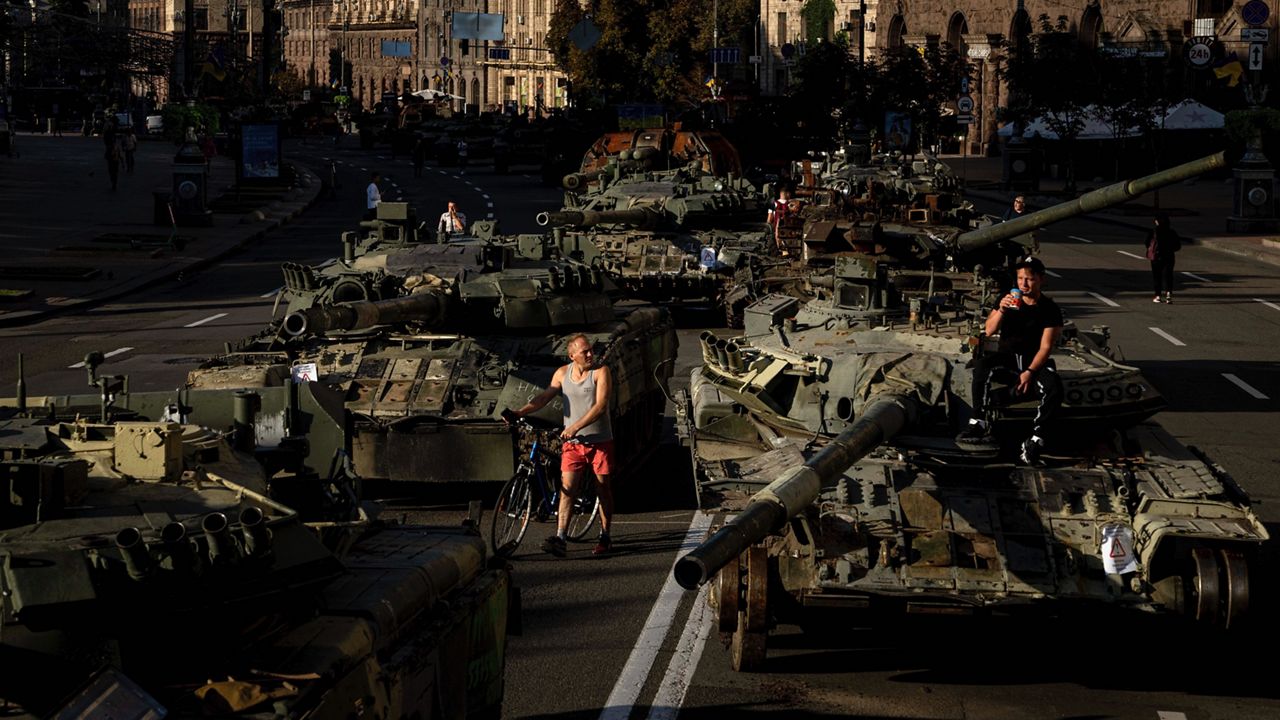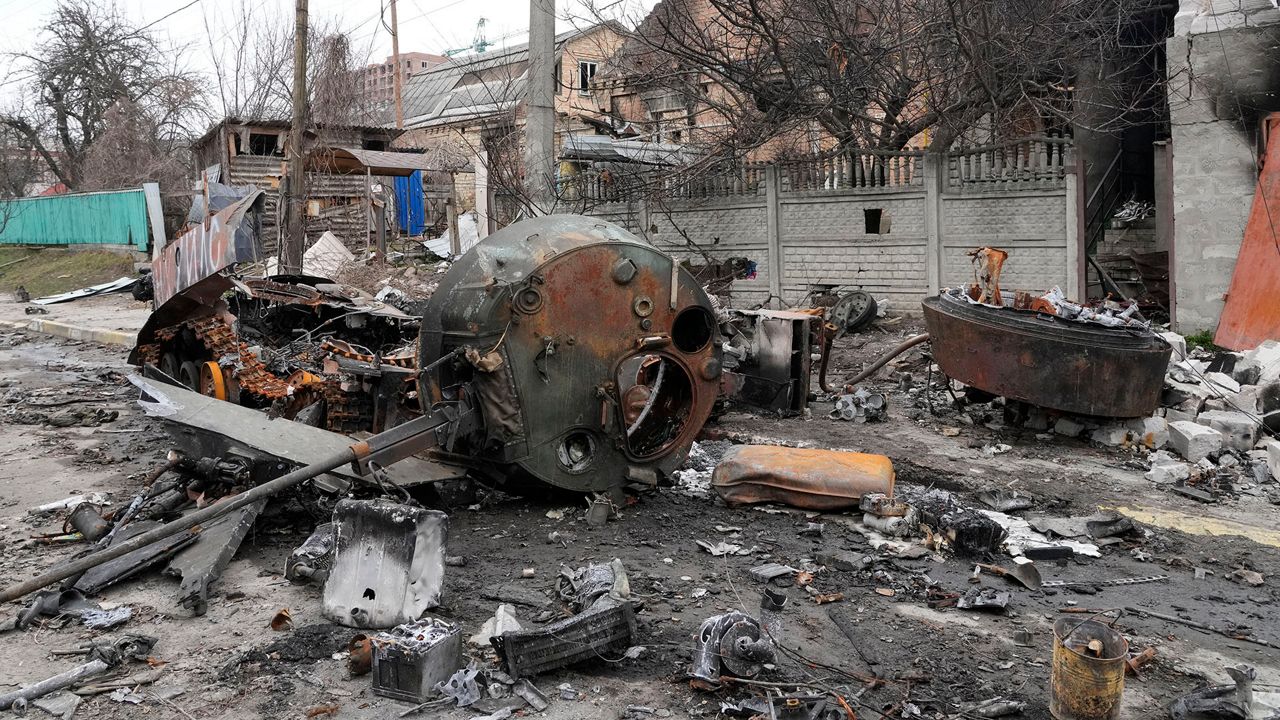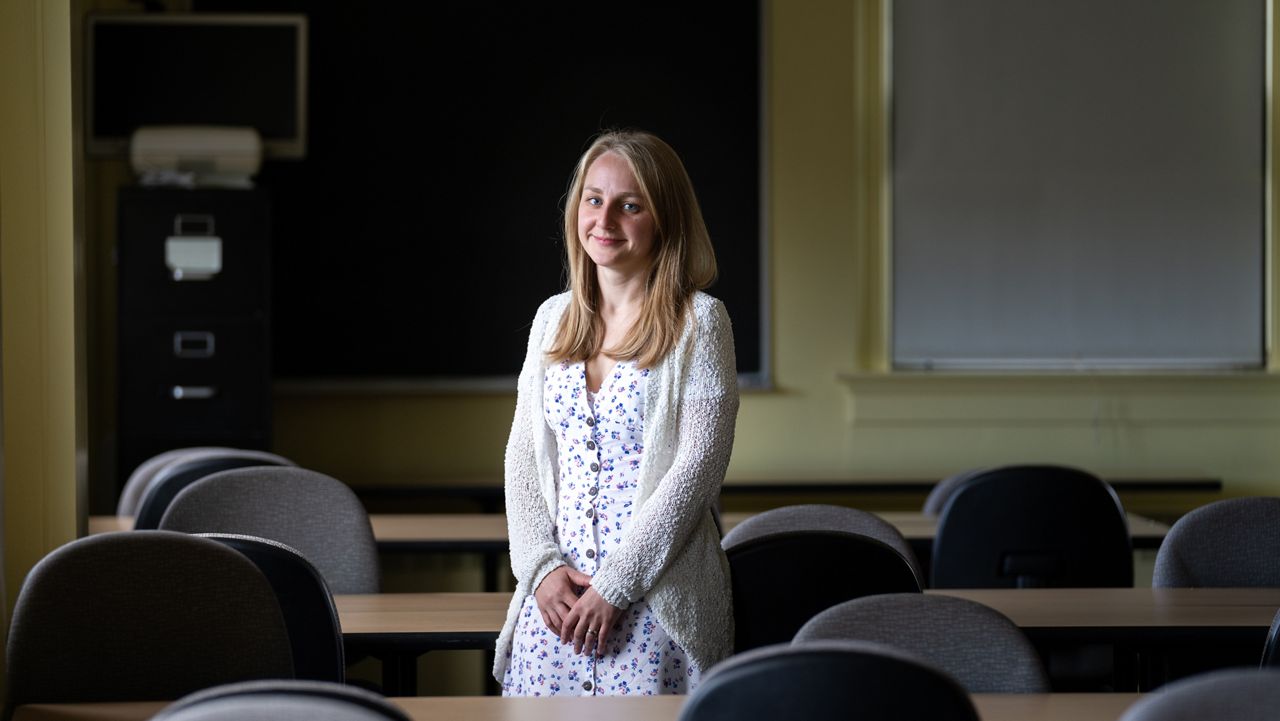The first of a two-part series on Oksana Katsanivska and her family, who fled Ukraine shortly after the war with Russia began and are now living in Oshkosh. While appreciative of the support from the Oshkosh community, they are determined to return to her homeland one day. Read part 2 here.
OSHKOSH, Wis.— She was sound asleep when the fuse was lit that would change her life forever.
A short time later, the phone rang. She hadn’t cleared the cobwebs when the voice on the other end began to fill her in on the horror.
“‘Do you know that it started?’” a cousin told Oksana Katsanivska.
It was a morning wake up call like no other.
“I’m like, ‘What started? What are you talking about?’” Katsanivska said. “And he goes, ‘The war started.’”
She sat up in bed and began the interrogation. “What do you mean, the war started? How? What’s going to happen?”
“And he was like, ‘OK, I need to go. Take care.’”
It was Feb. 24. Russian President Vladimir Putin ordered his military troops to attack Ukraine.
Katsanivska laid back down. Stunned.
She was home alone with her two small children in the city of Iziaslav, Ukraine — about four hours west of the capital, Kyiv. Her husband was out of the country visiting family.
She did what everyone else was doing across the globe. She turned on the television.
“There were bombings all around the country,” she said. “I was like, ‘OK, so what do we do now?’ I mean, it’s war in the whole country. And I called my parents, and I was like, ‘Can you please come to our place?’ I was worried. I mean, two small kids and me. I did not know what steps to make, like what to do.”

This is just one story about war. What it means to those affected, the impossible decisions they’re forced to make and how people, a half world away, will open their arms to offer support and safe refuge.
It is a story no one wants to call their own, but one that millions are forced to write.
****
Nights were the worst. That’s when the constant wail of air raid sirens hung in the air. Residents were told they should go to their basements.
“I didn’t feel very comfortable about waking up my kids in the middle of the night and taking them there because most of the bombings, they took place at night,” Katsanivska said. “I was like, ‘Well, I do not want to wake them all the time because I will scare them even more.’ So we set up a sleeping spot there.”
But it was not comforting.
“I was like, ‘OK, this is just wrong. Why do my kids need to sleep in the basement?’” she said. “Then after a few days, my son — who wasn’t even three — every time he heard this siren going on and on he was like, ‘We have to go to the basement!’ And that’s when I realized I do not want him to have these memories from childhood. I was like, ‘No, this is just wrong.’”
On March 3, she and her two children left their home and everything they knew.
“We were leaving, and I did not know when we were coming back,” Katsanivska said.
Her father-in-law would drive them 12 hours to the Hungarian border—Katsanivska in the back seat of a small car sandwiched between two child seats — where she would meet up with her husband.
“We crossed (the border) and I was pushing the stroller carrying a backpack,” Katsanivska said. “My son was carrying his tiny backpack with toys he packed for himself and his sister. And my mother-in-law, she was dealing with my suitcase and her suitcase. Basically, that’s all we had.”
****
Dr. Jordan Karsten was uneasy as he watched the events in Ukraine unfold.
Chair of the anthropology department at the University of Wisconsin-Oshkosh, he had made many trips to Ukraine for excavations. He knew many people there, including Katsanivska, who had served as his translator for nearly a decade.
And he had an idea.
He had courses to staff. Katsanivska had advanced degrees and was a linguist.
“I said, ‘Well perhaps you might want to come teach some classes here,’” Karsten said. “And then I reached out to some other departments on campus where she’d be a good fit and they were also looking to staff some courses. So, that gave us the opportunity to offer her a job if she wanted that.”
Katsanivska and her family decided to come. When they arrived, Karsten had an apartment ready with everything they would need.
“I put an email out to the campus community,” said Karsten, “Just saying, ‘Hey, we have some visitors coming from Ukraine who are going to be staying here and working here. They need a few things. They had to leave the country without most of their belongings.’"
“And the response was overwhelming. I mean, I got dozens and dozens and dozens of emails from folks. People came through with everything that they could have ever needed. And even things we didn’t even think of, let alone gift cards and all this. So yeah, I think the UW-Oshkosh community, it was kind of amazing to see how great the people are here.”
****
Worry is always with her. Her parents, her sister and other family members and friends remain in Ukraine. Many, like her sister’s husband, are in the military.
“I mean, my parents will never tell me something is wrong,” Katsanivska said. “They don’t want me to be stressed.”
It’s not working.
“It’s like this constant feeling of fear for somebody,” Katsanivska said. “Even though there might not be very serious danger. But I mean, it’s always danger. You never know what city they’re going to hit next.”
This a life she did not want. Through friends and family, social media and Ukraine media, she has seen the destruction Russia has caused to her country, and the unspeakable atrocities that occurred in places like Bucha.

“It might sound wrong but at some moment, I think it was the Bucha moment actually, I stopped thinking of them as human beings,” she said of the Russians. “Because humans do not do that kind of stuff.”
She is asked if hate has entered the picture.
“I don’t want hate, or hatred, to enter my heart, let’s put it this way,” Katsanivska said. “Because it’s a dark feeling. It’s black. And if you don’t stop it in time, it kind of eats you from the inside. It’s hard to be happy, by any means, if you hate somebody really bad. And with the Russians, you cannot hate them a little. It’s like if you start, you just … So yeah, my option is I do not hate them. I just loathe. Like, I don’t want to be anywhere around them.”
But yet, that is her wish. She wants to return to her country, and her home, and raise her family in a land that belongs to them.
With the Russians as her neighbors.
Story idea? You can reach Mike Woods at 920-246-6321 or at: michael.t.woods1@charter.com



